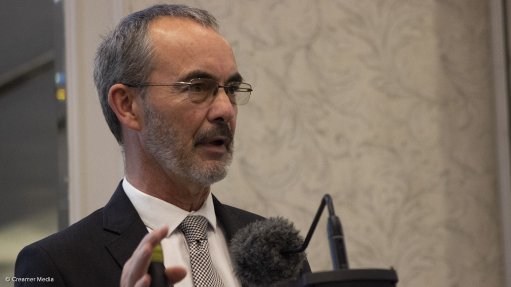
Minerals Council South Africa chief economist Henk Langenhoven
Minerals Council South Africa chief economist Henk Langenhoven has said mining accounts for more than R7-trillion of value on the JSE, indicating that the sector still enjoys substantial interest despite a slowdown in recent years.
Speaking at the Mineral and Petroleum Resources Development Act (MPRDA) Review Summit hosted by the Department of Mineral Resources and Energy (DMRE), in Johannesburg, on July 13 and 14, he emphasised the importance of ensuring the smoothing out of the many bottlenecks in the South African mining industry to tap into this potential – particularly with regard to ensuring policy certainty.
“There is interest in the sector if we can produce the goods,” Langenhoven said.
With this in mind, he revealed that the Minerals Council was currently conducting a comprehensive study to analyse the positive and negative effects of the MPRDA since its implementation in 2004. Langenhoven noted that the study aims to identify the provisions and instruments within the Act that should have stimulated growth, as well as the outcomes of these measures.
He expressed optimism about gaining valuable insights from this analysis.
The MPRDA Review Summit brought together key industry leaders and stakeholders to discuss the current state of the mining sector in South Africa and evaluate the impact of the MPRDA over the past 19 years.
Advocate Sandile Nogxina, speaking at the summit, implied that no laws should be set in stone and emphasised the need for adaptable legislation. He stated that laws must be capable of responding to the ever-changing dynamics of the environment they regulate.
In his address, DMRE director-general Jacob Mbele acknowledged the crucial role of South Africa's mining industry in economic and socioeconomic development. He highlighted the nation's abundant reserves and the potential to meet a significant portion of global demand for various commodities, particularly those required for the green transition.
The promulgation of the MPRDA almost 20 years ago represented a significant legislative shift in South Africa's mining industry. By placing mineral and petroleum resources under the custodianship of the State, the Act aimed to ensure equitable access to these resources, he said.
However, Mbele acknowledged the need for continuous review and potential amendment of the Act and other related policies to address shortcomings and promote sustainability and transformation within the industry.
Mbele further discussed previous attempts to amend the MPRDA, including efforts in 2008 and 2013, which were intended to address ambiguities, regulate associated minerals, and enhance provisions related to mineral beneficiation.
In 2013, then-President Jacob Zuma rejected the MPRDA Amendment Bill. This was because there were issues with the way the public was involved in the decision-making process in the National Council of Provinces.
Additionally, there were two sections in the Bill that raised concerns about whether it aligned with the Constitution. These procedural defects and constitutional inconsistencies led to the rejection of the Bill.
Acknowledging that, as a result of this, gaps in the law still exist, Mbele emphasised the importance of reflecting on the MPRDA's implementation, gathering input from industry stakeholders, and soliciting feedback to inform the review process.
He said that the reports generated from the feedback gathered at the summit will serve as the foundation for the DMRE's review of the MPRDA and other transformative tools, such as the Mining Charter.
Mbele reaffirmed the department's commitment to creating an enabling environment for investment and transformation within the mining and petroleum sector.